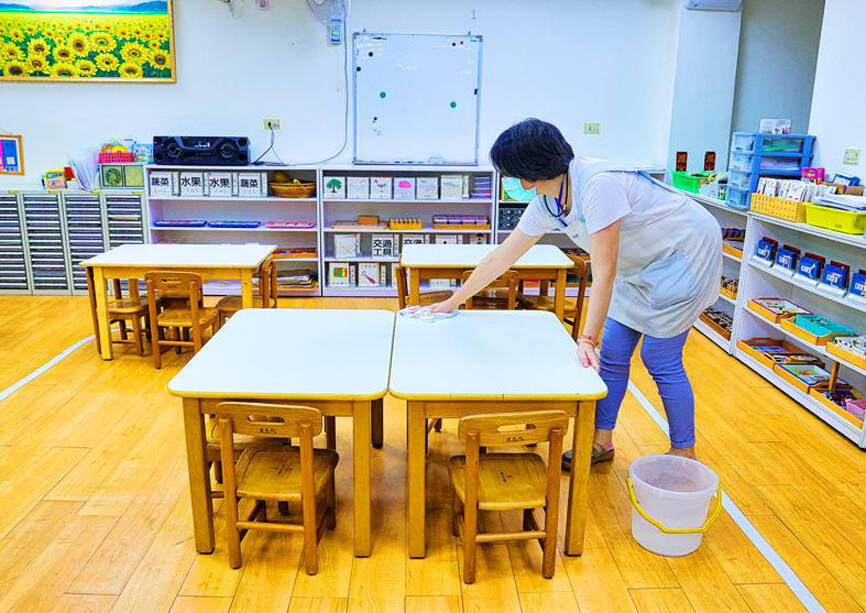Taiwanese medical researchers have linked air quality in kindergarten classrooms to increased risk of COVID-19 cluster infections, a research paper published in the journal Indoor Air showed.
The study is based on observed air quality in a Taipei-based kindergarten and viral transmission estimations utilizing the Wells-Riley model from August to November 2021, National Taiwan University Hospital researchers told a news conference earlier this month marking the article’s publication.
The research team found that carbon dioxide in classrooms and staff offices increases with use during the workweek, peaking each day in the afternoon, said coauthor Chen Chung-yen (陳宗延), an epidemiologist at the hospital.

Photo: CNA
The concentration of the substance — a counter indicator of air quality — reaches 850 parts per million in an average hour, assuming that 30 students are in a room, he said.
Carbon dioxide measurements are used as a proxy for aerosol concentrations as ventilation has about the same effect on both values, he added.
The air quality measurements indicated that the reproduction number of SARS-CoV-2, the virus that causes COVID-19, ranged from 3.01 to 3.12 during school hours, meaning an infected person would on average spread the virus to three people, Chen said.
The study suggests that reducing class sizes and the time spent indoors, and improving ventilation would decrease cluster infections, he said, adding that the air in a 33-ping room (109m2) containing 30 children should be changed 3.6 to 5.4 times per hour.
Ideally, a class should have two to 10 people spending no more than three hours in each room, but such conditions are unlikely to be met under real-world conditions, he said.
The research team recommends that kindergartens utilize air quality monitors, open-air classes and high-efficiency particulate air filters for poorly ventilated rooms to protect public health, he said.

A preclearance service to facilitate entry for people traveling to select airports in Japan would be available from Thursday next week to Feb. 25 at Taiwan Taoyuan International Airport, Taoyuan International Airport Corp (TIAC) said on Tuesday. The service was first made available to Taiwanese travelers throughout the winter vacation of 2024 and during the Lunar New Year holiday. In addition to flights to the Japanese cities of Hakodate, Asahikawa, Akita, Sendai, Niigata, Okayama, Takamatsu, Kumamoto and Kagoshima, the service would be available to travelers to Kobe and Oita. The service can be accessed by passengers of 15 flight routes operated by

GIVE AND TAKE: Blood demand continues to rise each year, while fewer young donors are available due to the nation’s falling birthrate, a doctor said Blood donors can redeem points earned from donations to obtain limited edition Formosan black bear travel mugs, the Kaohsiung Blood Center said yesterday, as it announced a goal of stocking 20,000 units of blood prior to the Lunar New Year. The last month of the lunar year is National Blood Donation Month, when local centers seek to stockpile blood for use during the Lunar New Year holiday. The blood demand in southern Taiwan — including Tainan and Kaohsiung, as well as Chiayi, Pingtung, Penghu and Taitung counties — is about 2,000 units per day, the center said. The donation campaign aims to boost

ENHANCING EFFICIENCY: The apron can accommodate 16 airplanes overnight at Taoyuan airport while work on the third runway continues, the transport minister said A new temporary overnight parking apron at Taiwan Taoyuan International Airport is to start operating on Friday next week to boost operational efficiency while the third runway is being constructed, the Ministry of Transportation and Communications said yesterday. The apron — one of the crucial projects in the construction of the third runway — can accommodate 16 aircraft overnight at the nation’s largest international airport, Minister of Transportation and Communications Chen Shih-kai (陳世凱) told reporters while inspecting the new facility yesterday morning. Aside from providing the airport operator with greater flexibility in aircraft parking during the third runway construction,

American climber Alex Honnold is to attempt a free climb of Taipei 101 today at 9am, with traffic closures around the skyscraper. To accommodate the climb attempt and filming, the Taipei Department of Transportation said traffic controls would be enforced around the Taipei 101 area. If weather conditions delay the climb, the restrictions would be pushed back to tomorrow. Traffic controls would be in place today from 7am to 11am around the Taipei 101 area, the department said. Songzhi Road would be fully closed in both directions between Songlian Road and Xinyi Road Sec 5, it said, adding that bidirectional traffic controls would